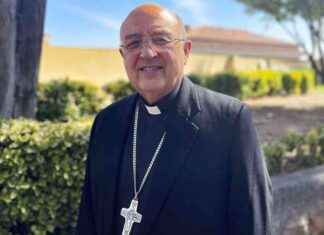Will the eternally defeated finally win an election? On February 15, Kenyan political veteran Raila Odinga filed for the position of chairperson of the African Union (AU) Commission. Sometimes searching for his words, the 79-year-old man, visibly tired, assured television cameras that he “wants to take up the continental challenge” and succeed the Chadian Moussa Faki Mahamat in February 2025.
Since his defeat in the 2022 presidential election in Kenya – the fifth of his long career – the man nicknamed “Tinga” (“the tractor”) due to his longevity has been confined to the role of leader of the opposition . Accession to the head of the executive of the pan-African institution could allow him to leave the Kenyan political scene through the front door in the event of victory. An initiative that his rival, President William Ruto, supports, not without opportunism.
The two men have recently become closer. At the end of February, they appeared side by side, sticks in hand, on the farm of Ugandan President Yoweri Museveni, in Kisozi, facing a herd of Ankole cows, sacred in East Africa. The three men discussed regional issues in this rural setting. The opportunity for Yoweri Museveni to provide Ugandan support for Raila Odinga. An initiative also supported by his Rwandan counterpart, Paul Kagame.
Former political prisoner
If Raila Odinga is the favorite, it is because he is currently the only one to have declared himself as president of the AU Commission. Others could join it by the end of May, the deadline for submitting applications. According to several African Union diplomats, Tanzania, Madagascar, Djibouti, Comoros and Somalia plan to present candidates.
Until mid-March, doubt persisted for procedural reasons specific to the African Union. But a meeting of African foreign ministers on Friday (March 15) endorsed the principle of rotation in alphabetical order (in English), which gives priority to the East African region for the position of chairperson of the AU Commission , and to North Africa for the position of vice-president. In the election in February 2025, candidates will then be elected in a two-thirds majority vote.
The way now seems clear for the former political prisoner, tortured numerous times in the 1980s, who may finally have his consolation prize. However, it will be necessary to convince the fifty-four other member states of the merits of his presidency while his health is declining and he will be in his eighties at the time of the election. A Kenyan parliamentarian assures, in private, not to worry, “because Baba is still extremely lively”. “He looked worn out during the presidential campaign because the pace is high, but at the AU leadership the pace will be easier for him,” says Nic Cheeseman, professor of political science at the University of Birmingham. UK.
Revenge for Kenya?
It would also be revenge for Kenya. Favorite in the 2017 elections, Nairobi celebrated too early the victory of its candidate Amina Mohamed, ultimately beaten to the wire by Moussa Faki Mahamat. “This time, we must not make the same mistakes, Kenya must lobby across the continent,” underlines Liesl Louw-Vaudran, researcher specializing in the AU for the International Crisis Group (ICG). Raila Odinga already seems to be getting down to it: during his announcement in February, he was supported by another monster of African politics, former Nigerian leader Olusegun Obasanjo, 87, who promised him his support.
It is impossible, however, not to see in Raila Odinga’s candidacy reasons “primarily linked to Kenyan political dynamics”, observes Nic Cheeseman. In 2023, he paralyzed the country for weeks by calling on his supporters to rally against the high cost of living and the election results. In the event of victory at the AU, “he will no longer be able to intervene as an opposition leader, will no longer be able to call for demonstrations and will have to maintain cordial relations with William Ruto,” underlines the researcher.
In 2018, Rail Odinga had already been offered the position of high representative of the African Union for infrastructure development, only to move away after the serious post-electoral crisis which opposed him to the head of state of the era, Uhuru Kenyatta. A purely symbolic position that he occupied for five years, and of which no member of the AU visibly remembers. “This position allowed me to learn about each of the African countries,” argued the main person concerned in his speech on February 15. Without convincing too much.







